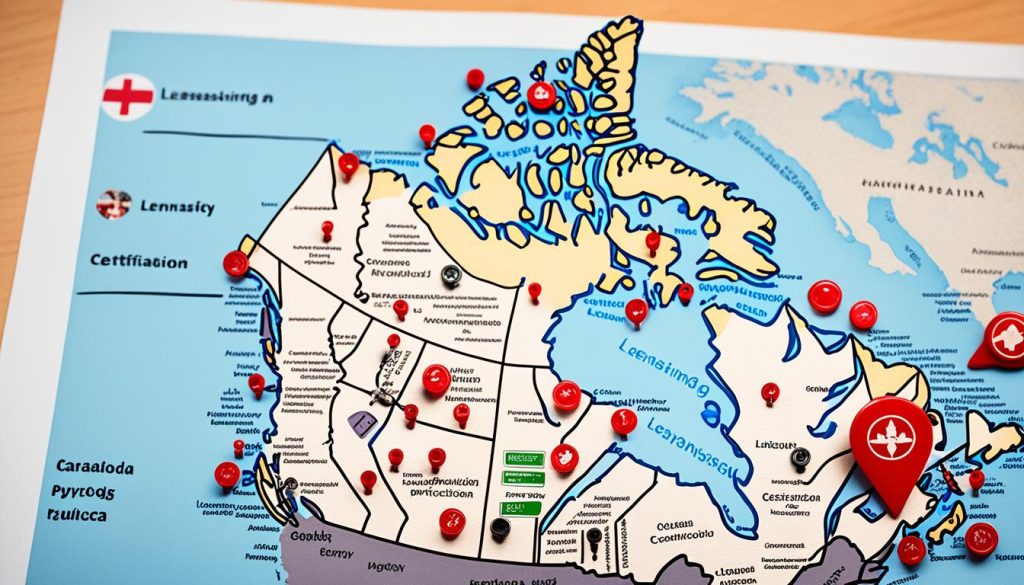Are you fascinated by the human mind and human behaviour? Do you have a passion for helping others and understanding the complexities of the human psyche? If so, a career in psychology might be the perfect fit for you. As a psychologist, you can delve deep into the minds of individuals and make a positive impact on their lives. However, if you’re considering pursuing this career path in Canada, you may have a lot of questions. How long does it take to become a psychologist in Canada? How many years is the psychology course in Canada? What opportunities for psychology internships are available?
In this career guide, we will address all these questions and more to help you navigate the path to becoming a psychologist in Canada. Whether you’re a high school student exploring your future options or someone considering a career change, this guide will provide you with the necessary information to pursue your dream profession in psychology. So, let’s dive in and explore the exciting journey of becoming a psychologist in Canada!
Defining a Psychologist’s Role
Psychologists are healthcare professionals who provide patient care related to their mental health. They assess the psychosocial patterns, cognitive abilities, and emotional state of both children and adults. Psychologists play a vital role in understanding what a psychologist is and the duties they perform in supporting the wellbeing of their patients.
Understanding the Duties of a Psychologist
Psychologist duties and responsibilities may include assessing patient behaviour, diagnosing the patient and providing therapy, using standard psychological testing, reviewing patient medical history, conducting patient interviews, writing reports, attending clinical conferences, and providing consultation services. Psychologists work to understand what does a psychologist do and how they can best support their patients’ mental health needs.
Assessing and Treating Mental Health Conditions
A key aspect of a psychologist’s role is assessing and treating mental health conditions. Psychologists utilize their expertise in psychology to evaluate the psychological, emotional, and cognitive factors contributing to a patient’s mental health state. They then develop and implement appropriate treatment plans, which may include therapy, counseling, and the use of psychological testing and assessment tools.
Working Environments for Psychologists
Psychologists can work in a variety of settings, including hospitals, private practices, schools, community mental health clinics, and other healthcare facilities. Depending on their area of specialization, psychologists may work with a diverse range of patients, from children to older adults, and address a wide spectrum of mental health concerns. Understanding where psychologists work is crucial in determining the best fit for one’s career aspirations.
Educational Requirements
To become a psychologist in Canada, aspiring individuals must obtain advanced education up to the doctoral degree level. This comprehensive journey encompasses completing an undergraduate degree, a master’s degree, and ultimately, a doctoral degree.
1. Obtaining a High School Diploma
The first step towards a career as a psychologist in Canada is obtaining a high school diploma. This foundational qualification lays the groundwork for pursuing post-secondary education in the field of psychology.
2. Pursuing an Undergraduate Degree
After completing high school, the next step is to pursue an undergraduate degree, typically a Bachelor of Arts (BA) or a Bachelor of Science (BSc) in psychology. This four-year program provides a comprehensive introduction to the principles, theories, and research methods of psychology. Many universities in Canada offer excellent psychology degrees, catering to students’ diverse interests and career aspirations.
3. Completing a Master’s Degree
With an undergraduate degree in hand, the next step is to pursue a master’s degree in psychology. This advanced program, which typically takes two years to complete, allows students to delve deeper into specific areas of psychology, such as clinical, counselling, or industrial-organizational psychology. The master’s degree equips aspiring psychologists with the knowledge and skills necessary for providing evidence-based treatment and intervention strategies.
4. Pursuing a Doctoral Degree
The final educational hurdle for becoming a registered psychologist in Canada is the completion of a doctoral degree, such as a Doctor of Philosophy (PhD) or a Doctor of Psychology (PsyD). This advanced degree, which can take an additional four to seven years to complete, prepares individuals for independent practice, research, and teaching roles in the field of psychology. The doctoral program typically includes a comprehensive dissertation or research project, as well as extensive clinical training and supervised practice.
It’s important to note that some universities in Canada may offer a direct transition from an undergraduate degree to a PhD program, allowing students to bypass the separate master’s degree requirement. Prospective psychologists should thoroughly research the educational pathways and requirements specific to their desired field of specialization and the province or territory in which they plan to practice.

Gaining Practical Experience
After completing the educational requirements to become a psychologist in Canada, aspiring professionals must gain practical experience through internships and supervised practice. This hands-on training is crucial for developing the necessary skills and competencies to provide effective psychological services.
1. Internships and Supervised Practice
Clinically supervised experience varies by jurisdiction in Canada, but typically involves at least one year of supervised practice. During this time, aspiring psychologists work closely with experienced, licensed professionals to apply their knowledge and hone their clinical skills. Internships provide opportunities to assess patients, develop treatment plans, and deliver various therapeutic interventions, all under the guidance and oversight of seasoned psychologists.
2. Specializing in a Subfield
In addition to the core practical experience, psychologists in Canada may choose to specialize in a particular subfield of psychology, such as clinical, counselling, school, or forensic psychology. This additional training and specialization can involve further education, research, and supervised practice in the chosen area of focus. Specializing allows psychologists to develop advanced expertise and provide more specialized services to their patients.
By gaining practical experience through internships and supervised practice, and potentially specializing in a subfield, aspiring psychologists in Canada can develop the necessary competencies to provide high-quality, evidence-based psychological services to their clients. This hands-on training, combined with the rigorous academic requirements, ensures psychologists are well-prepared to address the diverse mental health needs of individuals and communities across the country.
Licensing and Certification
In Canada, the path to becoming a licensed psychologist involves navigating the specific requirements set by each province and territory. Aspiring psychologists must not only complete advanced education at the master’s and doctoral levels, but also demonstrate their competence through a series of rigorous examinations and assessments.
1. Provincial Requirements
The provincial and territorial regulatory bodies governing the practice of psychology in Canada oversee the licensing process for psychologist licensing canada. While the specific requirements may vary, they generally involve a combination of educational qualifications, supervised clinical experience, and successful completion of written and oral exams.
For instance, in Ontario, the College of Psychologists of Ontario (CPO) is responsible for licensing and regulating the psychology profession. Candidates must hold a doctoral degree in psychology, complete a minimum of 1,500 hours of supervised practice, and pass the Examination for Professional Practice in Psychology (EPPP) as well as an oral examination.
2. Passing Exams and Assessments
The how to become a psychologist canada process typically culminates in a series of exams and assessments designed to evaluate a candidate’s theoretical knowledge, clinical skills, and professional competence. These may include written examinations, such as the EPPP, as well as in-person assessments, such as structured oral interviews and case presentations.
The successful completion of these assessments, along with the fulfillment of all educational and supervised practice requirements, allows aspiring psychologists to obtain the necessary licensing or certification to legally practice their profession in Canada.

How to Become a Psychologist in Canada?
Becoming a psychologist in Canada requires a dedicated educational path and the attainment of various professional certifications. The journey to becoming a how to become a psychologist canada typically involves the following key steps:
- Complete an undergraduate degree, preferably in psychology or a related field.
- Pursue a master’s degree in psychology, which may include a thesis or research component.
- Obtain a doctoral degree, such as a PhD or PsyD, in a specialized area of psychology.
- Gain supervised practical experience through internships or residencies.
- Meet the licensing requirements set by the provincial or territorial regulatory body.
- Continuously engage in professional development activities to stay current with the latest research and best practices in the field of how to become a psychologist canada.
Throughout this journey, aspiring psychologists in Canada must demonstrate a strong passion for understanding human behavior, a commitment to evidence-based practice, and a desire to make a positive impact on the lives of their clients. With the right education, experience, and professional certifications, individuals can embark on a rewarding career as a registered, chartered, or qualified psychologist in Canada.
Career Prospects and Salaries
The future looks bright for psychologists in Canada, as the job market outlook remains strong. Psychologists are considered an in-demand occupation, with factors such as increasing awareness and demand for mental health services, an aging population requiring more psychological care, and the need for psychologists in a variety of settings like hospitals, schools, and private practices contributing to the positive job prospects.
1. Job Market Outlook
According to the Canadian Psychological Association, the job market outlook for psychologists in Canada is very favourable. The demand for mental health services is expected to continue growing, driven by greater public awareness and recognition of the importance of psychological well-being. Additionally, the aging population and their increasing need for psychological care further contribute to the positive job outlook for psychologists in the country.
2. Average Salaries for Psychologists
Psychologists in Canada are well-paid professionals, with the average annual salary for a psychologist being $141,091 according to the job search platform Indeed. This figure highlights the strong earning potential for those pursuing a career in psychology. Factors such as the level of education, specialized training, and experience can influence the specific salary range for psychologists in different areas of practice.

Continuing Professional Development
Psychologists in Canada are expected to engage in ongoing psychology continuing education canada activities to maintain their knowledge and skills. This can involve attending psychology conferences canada to learn about the latest research, theories, and best practices in psychology. Psychologists must also stay informed about new developments in their field by reading peer-reviewed journals and participating in latest research in psychology canada projects. Continuous learning and professional development ensures psychologists provide the highest quality of care to their patients.
1. Workshops and Conferences
Attending workshops and conferences is a crucial aspect of a psychologist’s professional development in Canada. These events provide opportunities to network with colleagues, learn from industry experts, and stay up-to-date with the latest advancements in the field. Psychologists can explore a wide range of topics, from evidence-based therapies to emerging research in various subfields of psychology.
2. Staying Up-to-Date with Research
Psychologists in Canada must also make a concerted effort to stay informed about the latest research in psychology. This involves regularly reading peer-reviewed journals, participating in research projects, and engaging with online resources and professional communities. By staying abreast of new findings, theories, and best practices, psychologists can ensure they provide their patients with the most effective and evidence-based care.
Exploring Subfields of Psychology
As the field of psychology continues to evolve, Canadian psychologists have the opportunity to specialize in a variety of subfields that cater to diverse patient needs and professional interests. Some of the most prominent specializations in Canada include clinical psychology, counselling psychology, school psychology, and forensic psychology.
1. Clinical Psychology
Clinical psychologists in Canada focus on the assessment, diagnosis, and treatment of mental health conditions. They utilize a range of evidence-based therapies, such as cognitive-behavioural therapy and psychoanalysis, to help patients manage disorders like depression, anxiety, schizophrenia, and addiction. Clinical psychology programs in Canada often require a doctoral degree and supervised clinical experience.
2. Counselling Psychology
Counselling psychologists in Canada provide guidance and support to individuals, couples, and families as they navigate personal, social, and interpersonal challenges. Their work may involve therapy, career counselling, and crisis intervention. Counselling psychologists often hold a master’s or doctoral degree and must obtain provincial licensing to practice.
3. School Psychology
School psychologists in Canada work within the education system to support the academic, behavioural, and social-emotional needs of students. They collaborate with teachers, administrators, and families to develop and implement interventions that foster student success. Educational psychology programs in Canada typically require a master’s degree or PhD.
4. Forensic Psychology
Forensic psychologists in Canada apply psychological principles and research to legal and criminal justice contexts. They may conduct risk assessments, provide expert testimony, develop rehabilitation programs, or assist with criminal profiling. Forensic psychologists typically hold a doctoral degree and have specialized training in the intersection of psychology and the law.
Skills and Qualities for Success
To become a successful psychologist in Canada, aspiring professionals must possess a diverse set of critical skills and personal qualities. These attributes not only enhance their effectiveness in providing high-quality care to patients but also contribute to their overall success in the field.
1. Analytical and Research Abilities
Strong analytical and research skills are essential for psychologists in Canada. They must be adept at designing and conducting robust studies, collecting and analyzing data, and interpreting findings to inform their clinical practice. Psychologists should have a keen eye for detail, the ability to think critically, and a passion for staying up-to-date with the latest research in psychology.
2. Communication and Interpersonal Skills
Excellent communication and interpersonal skills are crucial for psychologists in Canada. Psychologists must be able to effectively interact with and counsel their patients, building rapport, empathy, and trust. They need to listen attentively, ask insightful questions, and clearly convey complex information in a way that is easily understood by their clients.
3. Empathy and Emotional Intelligence
Traits like empathy and emotional intelligence are highly valued in the psychology profession in Canada. Psychologists must be able to understand and navigate the emotional states of their patients, demonstrating genuine concern and a desire to help. Emotional self-awareness and the ability to manage one’s own emotions are also essential for maintaining objectivity and providing effective support.
Challenges and Rewards
While the career of a psychologist in Canada can be deeply rewarding, it also presents some unique challenges. The emotional demands of the profession can be taxing, as psychologists must regularly engage with patients dealing with complex mental health issues, trauma, and distress.
Maintaining objectivity and managing the emotional toll of the work requires exceptional self-care and coping strategies. Psychologists must be adept at managing their own mental and emotional well-being to provide the best possible care for their patients.
1. Emotional Demands of the Profession
One of the primary challenges faced by psychologists in Canada is the emotional strain of the job. Psychologists often work with individuals experiencing significant mental health challenges, including depression, anxiety, addiction, and trauma. Listening to and supporting patients as they navigate these difficulties can be mentally and emotionally draining. Psychologists must develop strong resilience and self-care practices to prevent burnout and compassion fatigue.
2. Helping Others and Contributing to Society
Despite the challenges, the ability to make a meaningful difference in people’s lives is often cited as one of the most rewarding aspects of being a psychologist in Canada. Psychologists have the opportunity to help individuals and communities overcome mental health obstacles, improve their overall well-being, and contribute to the greater good of society. The satisfaction of witnessing a patient’s progress and growth can be immensely fulfilling for psychologists who are passionate about their work.

Resources and Support
Aspiring and practicing psychologists in Canada have access to a variety of professional resources and support networks. The Canadian Psychological Association (CPA) is the primary national organization representing psychologists, offering resources, advocacy, and professional development opportunities. Many provincial and territorial psychological associations also exist to support psychologists within their jurisdictions.
1. Professional Associations
The CPA is a valuable resource for Canadian psychologists, providing a platform for networking, sharing best practices, and staying up-to-date with the latest research and developments in the field. Provincial and territorial associations, such as the Ontario Psychological Association and the British Columbia Psychological Association, offer additional support and resources specific to their respective regions.
2. Mentorship Programs
In addition to formal professional associations, psychologists in Canada can also benefit from mentorship programs. These programs, offered by organizations like the CPA and various universities, pair experienced psychologists with those new to the field, providing guidance, advice, and career support. Engaging in a mentorship relationship can be instrumental in navigating the challenges and complexities of the psychology profession.
Overall, the wealth of professional associations and mentorship programs available to psychologists in Canada ensures that they have the necessary resources and support to thrive in their careers, contribute to the field, and provide the best possible care to their patients.
FAQ
1. How long does it take to become a psychologist in Canada?
To become a psychologist in Canada, individuals must undergo various levels of education, including an undergraduate degree, a master’s degree, and a doctoral degree. This typically takes between 8-10 years to complete.
2. What psychology jobs make the most money in Canada?
According to data, the highest-paid psychology jobs in Canada include clinical psychologists, industrial-organizational psychologists, and neuropsychologists. The average annual salary for a psychologist in Canada is around 1,091.
3. Do you need to go to medical school to become a psychologist in Canada?
No, you do not need to go to medical school to become a psychologist in Canada. Psychologists complete a doctoral degree in psychology, which is different from the medical training required for psychiatrists.
4. What is the most likely degree required for a school psychologist in Canada?
The most likely degree required to become a school psychologist in Canada is a master’s degree in school psychology or a related field, followed by a doctoral degree in educational or school psychology.
5. What is a person who studies psychology called?
A person who studies psychology is called a psychologist. Psychologists are healthcare professionals who assess, diagnose, and treat mental health conditions and provide counselling and therapy services.




